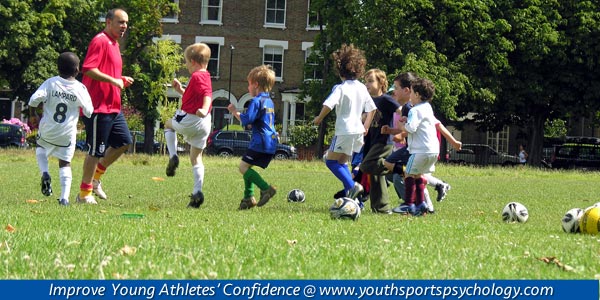
Parents: Motivating Your Young Athletes
Sports parents and coaches tell us that one of their biggest challenges is motivating their young athletes– especially without pressuring them.
Parents often say that their athletes have loads of talent, but don’t like to practice. Coaches sometimes say their kids like to goof off with each other more than they like playing the game.
These parents and coaches should understand that pressuring, pushing, or yelling at young athletes generally backfires. Such behavior often leads kids to enjoy sports less, which reduces their motivation.
So, what should coaches and parents do?
The key to motivating kids is to tap into the things about sports that they really enjoy. Rather than focusing on what you–the parent or coach wants–focus on what makes the kids come to practice and games. Of course, for each child this will be different.
Just as important, you should understand what causes kids to feel less motivated and what prompts them to quit.
Kids often take part in sports to be with friends or be part of a group. Or they want to experience the excitement of competition.
Other reasons include:
To learn and improve their skills, to improve their physical fitness, and to experience the “flow” or feeling of enjoyment that kids get from playing.
On the other hand, criticism from coaches and parents, lack of success, little progress and little fun will undermine their experience and hurt their motivation.
To help motivate kids, parents should show unconditional acceptance in sports. That means refrain from judging, criticizing or pressuring. They need to set a good example–and show kids that they are motivated in sports and other areas of their lives.
What’s more, adults need to help kids focus on their kids’ own improvement and refrain from comparing themselves to others.
Related Articles on Youth Sports:
- Motivate Kids with Growth Mindset, Not Fear
- Motivates Kids to Play Sports and Stay Active
- Are Your Athletes Self-Motivated or Driven by Parents?
*Subscribe to The Sports Psychology Podcast on iTunes
*Subscribe to The Sports Psychology Podcast on Spotify
Help Young Athletes Boost Confidence in Sports!
Every day, we receive letters from parents like you who want their children and teens to excel in sports. However, these parents can see fear, doubt, and frustration on the faces of their kids who struggle with the “inner” game of sports. But these parents have no idea how to help their kids overcome the worries, expectations and self-defeating thoughts that prevent their young athletes from feeling confident and successful.
You can benefit from our 15-plus years’ of work in sports psychology and sports parenting research. Now, you can tap into our secrets to sports success through a cutting-edge, 14-day program that helps young athletes overcome the top “mental game” challenges that sports parents face—and the top challenges young athletes face.


At the end of the day, external motivation can only push players so far. You have to figure out what makes them excited about the sport and what they love about it the most. It is going to be different for every player but a good coach does their best to pull all their players up.